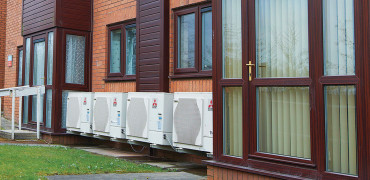In his last Spring statement, the Chancellor, Philip Hammond pledged that all housing developments built after 2025 should not include gas infrastructure, which means gas boilers are firmly in the crosshairs of the Government as the UK looks to meet its climate reduction obligations.
At the same time, the independent body, the Committee on Climate Change (CCC), is also pointing to the future with a cleaner national grid helping increase the attraction of renewable heating such as heat pumps.
The CCC predicts one million sales of air source heat pumps each year by 2030 so this technology, which has already been installed in around 200,000 homes over the last decade is set to become the common form of heating for our homes.
There are significant benefits from joining the future of sustainable heating
Inheriting the future
But it’s not just post-2025 new homeowners that will be dealing with heat pumps, they have already been embraced in the social housing sector and pioneering housebuilders are also realising how attractive a ‘future-proofed’ new home is becoming to a more environmentally aware public.
That means that more and more people are likely to move into a home with an existing heat pump system and this technology may be unfamiliar to them.
They will have simple questions such as how does it work? What are my heating bills going to be like? What differences will I notice over gas?
The following answers will therefore be useful for anybody moving into a home with an existing heat pump or anyone considering replacing their archaic carbon-intensive system.
1. How do you get heat from cold air?
There are different forms of heat pumps available but by far the easiest to install and use are air source heat pumps and this is where the market is seeing rapid growth.
An air source heat pump harvests heat directly from the outside air and transfers it to the home’s heating and hot water systems.
It can do this even when there is snow on the ground and temperatures are as low as -20°C. If you need even more reassurance just look at Scandinavia which has seen the most growth in heat pumps sales across Europe.
Modern heat pumps will also work as reliably as the ‘heat pump’ everyone already has in their home – otherwise known as a kitchen fridge.
Your fridge sits in the corner of your kitchen reliably keeping your food cold year after year. It moves the heat from the food to the back of the fridge.
An air source heat pump uses the same basic technology to take heat energy from the outside air and upgrade it to supply all the hot water and heating needed.
2. What will happen to my energy bills?
For every one kilowatt of electricity a heat pump consumes, it will produce an average of three or more kilowatts of heat energy because it is harvesting ‘free’ heat from the air.
This is why heat pumps are classed as renewable and why the Government is so keen on their mass deployment across the nation.
This also means that installing a heat pump can remove any gas bill whilst maximising any spend on electricity.
Homeowners should therefore see a reduction in their monthly bills compared with previous, high-carbon forms of heating.
3. Where’s my boiler?
You no longer need a boiler. In fact, you no longer need to ‘burn stuff’ to keep warm.
Your heat pump replaces the boiler and sits outside your home providing all the heating and hot water you need, reliably, day in day out, all year round.
The outdoor unit is connected to a cylinder inside the home to store the heated water. It can also work with traditional radiators or the increasingly popular underfloor heating.
And, the best heat pumps come with in-built, advanced, web-based controls which give you absolute control and visibility of your heating.
4. Is it cheaper than conventional heating?
Heat pumps can be cheaper to run and are certainly more environmentally sound compared to both gas and oil.
The other advantage is that heat pumps run continuously at a lower temperature which makes it much more cost effective to heat the entire property and not just one or two rooms – a choice which many facing high bills and fuel poverty are forced to make each winter.
Savings over oil go far beyond running costs as heat pumps will remove the uncertainty of winter fuel deliveries, the worry of fuel theft, and mean the dirty oil tank can be removed from your lovely garden.
They also require minimal maintenance, have longer lifespans than conventional boilers, and are far more efficient than older boilers, which will lead to lower monthly energy bills.
5. My radiators aren’t as hot, why not?
Typically, gas and oil boilers heat to at least 60⁰C and the hot water comes out at roughly 55⁰C.
Heat pumps are more likely to be configured to deliver a 40⁰C – 45⁰C temperature setting which is more than enough to keep your home comfortable.
And because a heat pump trickles heat into your home rather than delivers it in big spikes like a ‘traditional’ boiler, the temperature gauge can be lower, so you get a warm home without needing to have scalding radiators.
6. How do I control the heating?
This is where heat pumps win hands down over existing heating because the best ones come with sophisticated, in-built controls that allow you to monitor and alter your heating to suit you and your family.
Whether you are on the train home and want to turn on the hot water for a shower, or are on holiday on the beach and forgot to reschedule the heating, the intelligent controls allow you to change things wherever you are.
The added advantage for you as a homeowner as well is that this ability to interrogate the system from afar is also something that the technicians can do if the system needs any attention.
Not only will this mean that any issue can be resolved more quickly, it also means that if an engineer is ever needed to come out, they will know what the issue is before they even arrive and can make sure that they have any parts needed.
Join the future
Modern air source heat pumps have been available for over a decade now and there are an estimated 200,000+ homes that have now been fitted with this form of renewable heating in the UK alone. Across Europe other countries such as Germany are leading the way with sustained growth in sales of heat pumps.
This switch to renewable heating means that the chances of your next home having a heat pump are growing year on year as we get nearer to the end of traditional, carbon-intensive methods of heating homes.
So whether you have moved into a home with a heat pump, or are seriously considering future-proofing your existing home, there are significant benefits from joining the future of sustainable heating.
Max Halliwell is Communications Manager, Mitsubishi Electric Heating & Ventilation Systems



